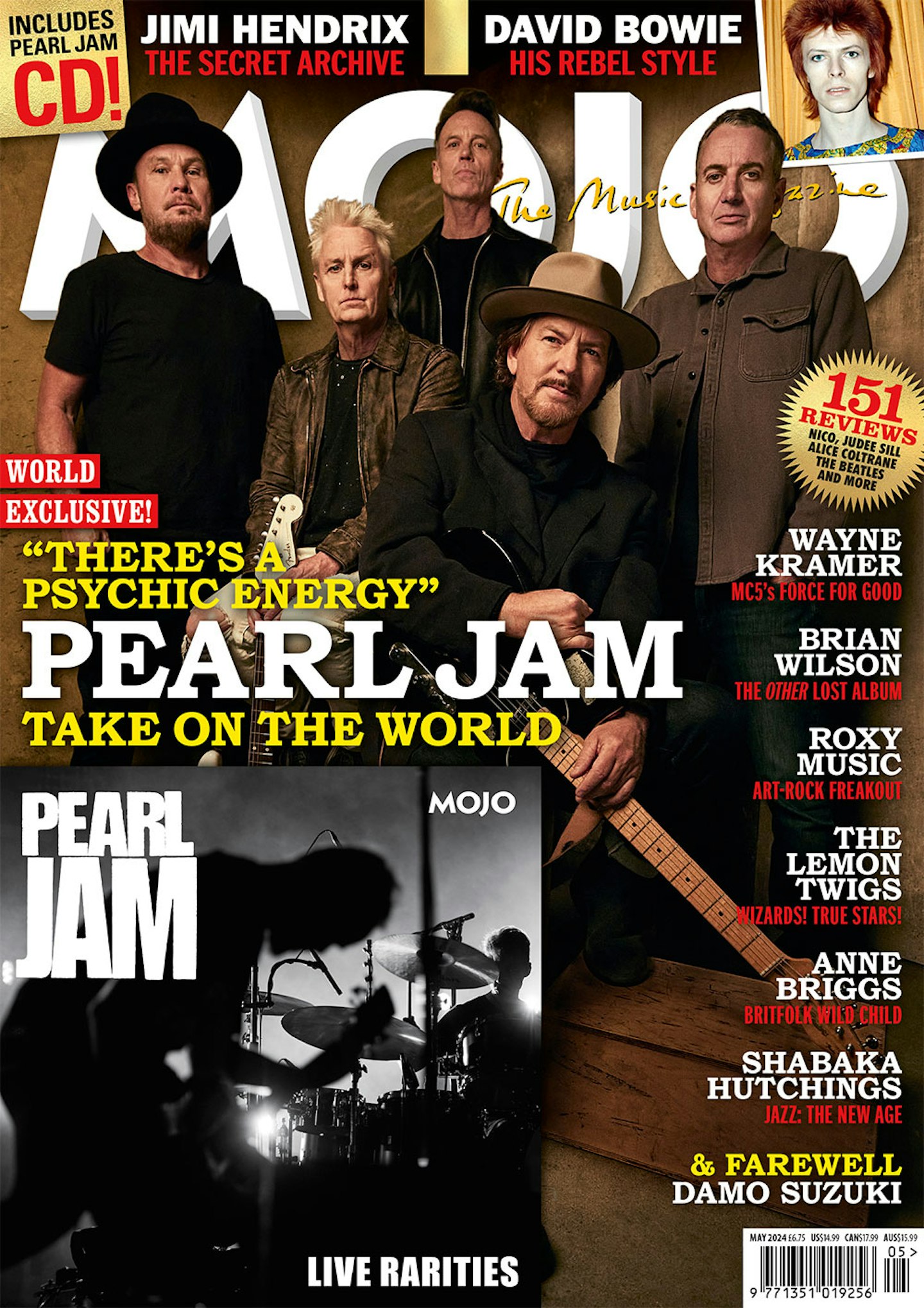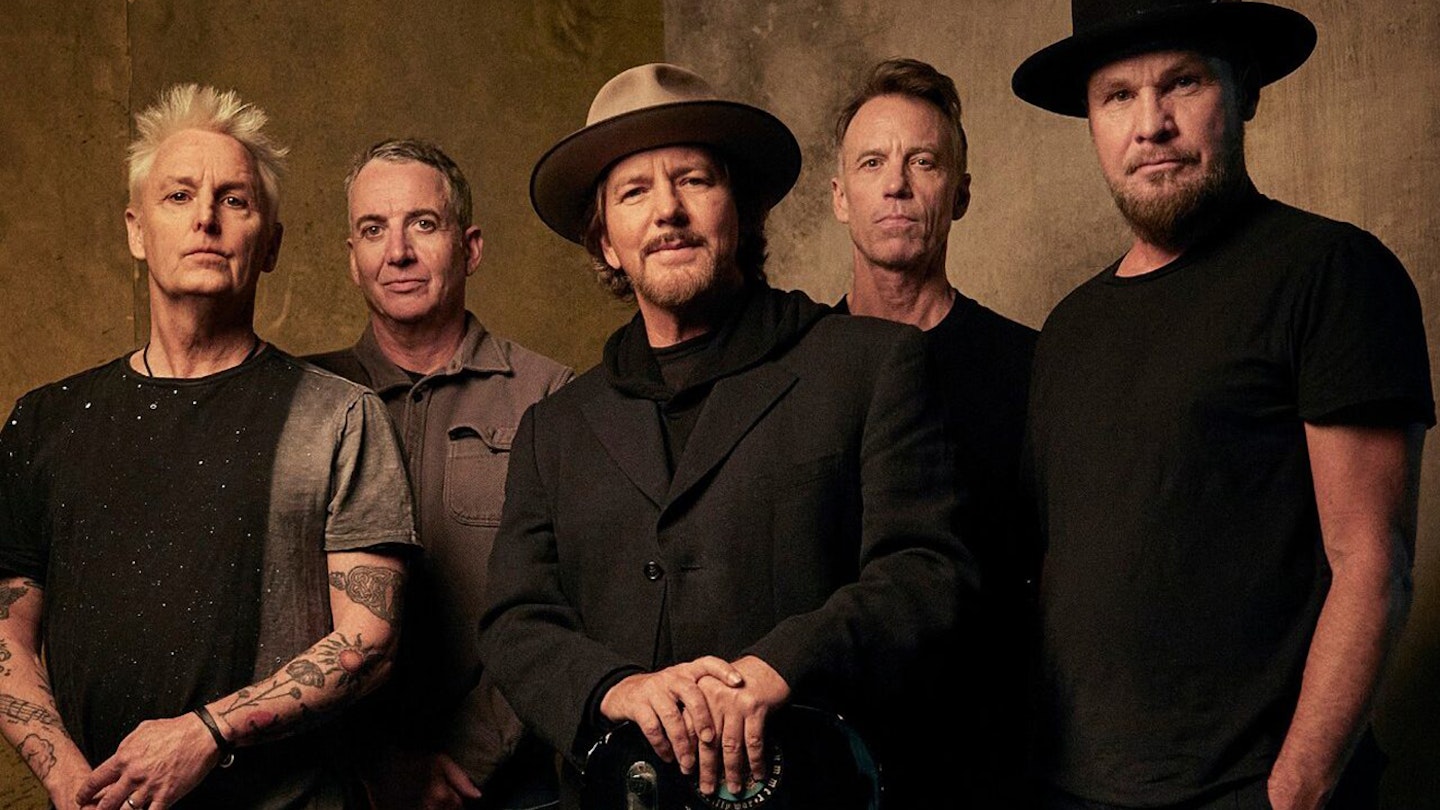Portrait: Danny Clinch
Forty years since the first Green River demos, 30 since the death of Kurt Cobain sank their world in chaos, Pearl Jam abide, flying a flag for rock’s outsiders, finding new ways to express their anger and their hope. A new album, Dark Matter, testifies to their uniqueness as musicians, but also as people. In this extract from MOJO’s exclusive cover feature with the band, they tell MOJO’s David Fricke about the making of the album and the ongoing redemptive power of music…
IT WAS A REMARKABLE STATEMENT FROM AN unlikely source. At a preview event for Pearl Jam’s twelfth album Dark Matter at the Troubadour in Los Angeles in February, frontman Eddie Vedder – notoriously leery of the standard rock’n’roll salesmanship – told the assembled media, “No hyperbole, I think this is our best work.”
The band’s co-producer Andrew Watt, at the Troubadour that day, was pleasantly stunned. The 33-year-old multiple-Grammy winner – whose hits and credibility run the gamut from Justin Bieber and Dua Lipa to Ozzy Osbourne and The Rolling Stones’ Hackney Diamonds – never heard Vedder or anyone else in Pearl Jam rave like that during the sessions.
But “Eddie was bringing it” on every take, Watt exclaims, “covered in sweat after finishing a vocal.” The producer, a lifelong fan, gleefully admits he wore a different Pearl Jam tour shirt to the studio every day for Dark Matter. “And we ignored that,” Vedder says today with a grainy chuckle. “I’m like, Guys, hang in there, just hear what it sounds like.”
“Stone [Gossard, guitarist] had a great riff,” bassist Jeff Ament says of opening track Scared Of Fear, a maelstrom caught on Pearl Jam’s first day with Watt in April 2021, in the basement studio of the producer’s Beverly Hills house. “It was just getting in a circle and throwing things out: ‘Let’s do this.’ Within five minutes of having the bones of the arrangement, Ed came up with the crux of the lyrics” – a feral summation of endangered joys and communion that could be about love, friendship or, in the chorus, the old Seattle (“We used to laugh/We used to sing/We used to dance/We used to believe”).
Pearl Jam’s last album, 2020’s Gigaton, was a more glacial experience. “The five of us made demos for ages,” Gossard says. “But it was individual efforts with people adding on.” In comparison, the live-band guts of Dark Matter came from four days in Watts’ basement in 2021 and two weeks in the summer of 2022 at Shangri-La, the Malibu studio built in the ’70s by The Band (it is now owned by Rick Rubin) and the setting for Martin Scorsese’s interviews with that group in his 1978 documentary, The Last Waltz.
“Bands from our generation – we’ve played gigs forever,” drummer Matt Cameron says. “We can set up anywhere and get right into a performance – loud guitar riffs, loud drumming, melodic hard rock. We’ve been doing it for decades.”
But Vedder felt like he was “tapping into a sacred space” at Shangri-La. The singer first saw The Last Waltz – “My introduction to so much music” – as a teenager in Chicago. He now has a poster for the film hanging in his home studio next to a bass guitar, bought in an auction, played by The Band’s Rick Danko.
“I can’t tell you how much it meant to be in that spot,” Vedder says. “It was like mining energy in a safe place.” In terms of his lyric writing, “It was a huge part of being able to go deep.”
Dark Matter is Pearl Jam’s most effective resolution since 1996’s seriously eclectic No Code of their sometimes dissonant ambitions as songwriters: the commercially immediate hard rock classicism of Ten and 2006’s Pearl Jam; and that wilful experimental tilt in texture and reflection on records like 2000’s Binaural. But this is a famously idealistic band now in late-middle age, assessing unfinished business and not happy about it. “I’m feeling done in, it’s rather stunning,” Vedder snaps in Running, a two-minute Fugazi style blitz.
The singer, though, won’t give up on the rescue and renewal in music. Asked about the title character in Waiting For Stevie, a mighty wall of Ten guitars glazed with bright, harmony vocals, Vedder describes “a young girl not feeling appreciated by her peers, who finds relief and connection in music at a show,” noting his own teenage salvation when he first heard The Who’s 1973 Mod opera Quadrophenia. “I felt more understood by that record than by teachers, family or peers.”
Then Vedder tells a story about taking one of his daughters to a Taylor Swift concert and “the run-up to it, making friendship bracelets with her and the generosity of these young girls and boys, trading these bracelets with different messages on them – lyrics, song titles, just acts of good will on these little bracelets. They had found their tribe; they were all agreeing on something.
“The craziest thing,” he goes on, “was it reminded me of punk rock crowds, of being aligned with all of the misfits in our town, back in the day. It was galvanising and powerful…”
“We got through by looking out for each other…” Their very first rehearsal, rock superstardom, the tragedies of Kurt and Roskilde and the ongoing journey of grunge’s last men standing, read David Fricke’s career-spanning interview with Pearl Jam in full only in the latest issue of MOJO. More information and to order a copy HERE!

